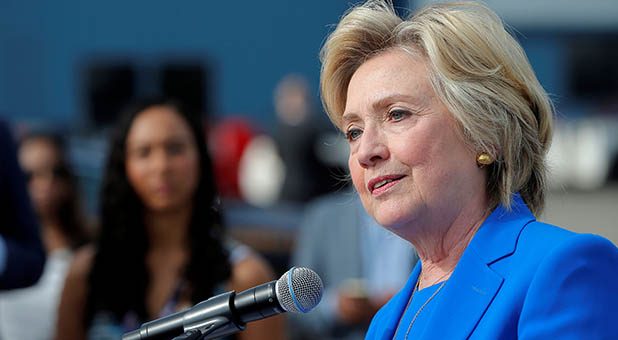Breaking Down Hillary Clinton’s Big Lie About Classified Material
During Wednesday evening’s “Commander-in-Chief Forum” in New York City, Democratic presidential nominee Hillary Clinton took a new line of defense for the presence of classified material on her private email server.
And while moderator Matt Lauer of NBC failed to follow up on the question, which came from a former Navy pilot who was in the audience, her claim was just as false as her previous efforts to convince voters she didn’t actually have classified material on her server. She said:
“[Y]ou know and I know classified material is designated,” she said. “It is marked. There is a header so that there is no dispute at all that what is being communicated to or from someone who has that access is marked classified.”
That’s not true.
Many categories of information are deemed classified, even if they are not marked as such. Last month, in a Reuters article on the issue, J. William Leonard, the former director of the Information Security Oversight Office under presidents Bill Clinton and George W. Bush, said State Department officials—including Clinton—were required to presume the information she was sending and receiving was “born classified.”
According to State Department’s Classification Guide, “high-level correspondence”—including letters, diplomatic notes or memoranda, or other reports of telephone or face-to-face conversations involving foreign chiefs of state or government, cabinet-level officials or comparable level figures are presumed to be “at least CONFIDENTIAL.” The actual classification, which comes later, would “depend upon the sensitivity of the contained information.”
That manual also states “some subjects, such as cooperation on matters affecting third countries, or negotiation of secret agreements, would merit original classification for up to 25 years.” Also, it states that, as a general rule, “when negotiations or other diplomatic exchanges are conducted in a nonpublic, off the record, channel, details should be classified.”
“Information obtained from (and in some contexts, shared with) other governments or international organizations of governments in a non-public, confidential exchange should be treated as Foreign Government Information (FGI) and classified for as long as necessary, taking into account both the inherent sensitivity of the information and the expectations of that party,” the guide states.
Additionally, the State Department’s Foreign Affairs Manual states that information may be classified derivatively in two ways:
- by reproducing, extracting, or summarizing classified information and applying classification markings derived from the source material, or
- as directed by a classification guide.
But as FBI Director James Comey pointed out in his testimony before the House Committee on Oversight and Government Reform, someone in Hillary Clinton’s position—and with her level of experience—should have known the information she was sending and receiving was classified. He said that even if the information itself wasn’t marked classified, “participants who know or should know that the subject matter is classified are still obligated to protect it.”
Clinton, however, said she didn’t know that “(c)” meant the adjoining information was classified. Likewise, she said she didn’t know any documents without classification headers could still be deemed classified—but she signed a State Department non-disclosure agreement saying she understood all of that.
Former New York City Mayor Rudy Giuliani, a surrogate for Republican presidential nominee Donald Trump, calls Clinton’s new line of defense a “flat-out lie.” Her falsehood, he added, demonstrates she is “fundamentally unfit to serve as president.”
“Her claims make a mockery of the legally binding non-disclosure agreements she signed after being confirmed as Secretary of State, where she attested she understood how to handle classified information and swore to protect it regardless of whether it was marked (c) or not,” he said. “The cavalier attitude shown by Hillary Clinton toward our nation’s most valuable secrets renders her completely unfit to hold the role of role of commander-in-chief.
“I firmly believe a special prosecutor should be appointed to investigate this matter, as it is clear to me and other former federal prosecutors that Hillary Clinton demonstrated a clear intent to violate the law.”















































